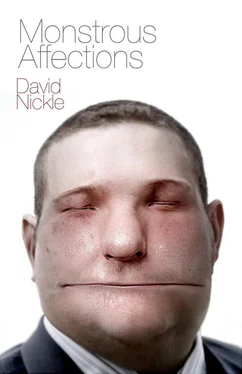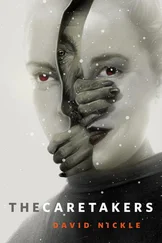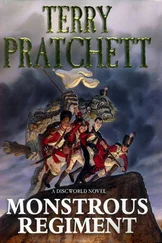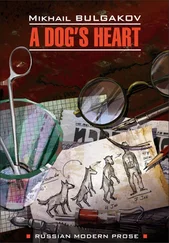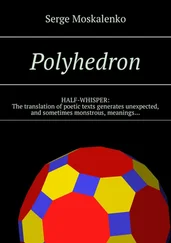David Nickle - Monstrous Affections
Здесь есть возможность читать онлайн «David Nickle - Monstrous Affections» весь текст электронной книги совершенно бесплатно (целиком полную версию без сокращений). В некоторых случаях можно слушать аудио, скачать через торрент в формате fb2 и присутствует краткое содержание. Город: Toronto, Год выпуска: 2009, ISBN: 2009, Издательство: ChiZine Publications, Жанр: Ужасы и Мистика, на английском языке. Описание произведения, (предисловие) а так же отзывы посетителей доступны на портале библиотеки ЛибКат.
- Название:Monstrous Affections
- Автор:
- Издательство:ChiZine Publications
- Жанр:
- Год:2009
- Город:Toronto
- ISBN:978-0-9812978-3-5
- Рейтинг книги:5 / 5. Голосов: 1
-
Избранное:Добавить в избранное
- Отзывы:
-
Ваша оценка:
- 100
- 1
- 2
- 3
- 4
- 5
Monstrous Affections: краткое содержание, описание и аннотация
Предлагаем к чтению аннотацию, описание, краткое содержание или предисловие (зависит от того, что написал сам автор книги «Monstrous Affections»). Если вы не нашли необходимую информацию о книге — напишите в комментариях, мы постараемся отыскать её.
Can it be love?
Monstrous Affections — читать онлайн бесплатно полную книгу (весь текст) целиком
Ниже представлен текст книги, разбитый по страницам. Система сохранения места последней прочитанной страницы, позволяет с удобством читать онлайн бесплатно книгу «Monstrous Affections», без необходимости каждый раз заново искать на чём Вы остановились. Поставьте закладку, и сможете в любой момент перейти на страницу, на которой закончили чтение.
Интервал:
Закладка:
When the vampires came to our camp outside the pit-heads, we knew how to deal with them. We only allowed them enough blood to complete the transaction: attempts to get any more were met with garlic and holy water and buckshot. The razor’s edge remained, even in Tevalier’s absence.
It paid off for us all over the years. Jim went professional in the early 1980s and moved to New York in ’86. Paul abandoned oils and embraced watercolour, and for five years made a fortune off royalties from art books and calendars featuring reproductions of his hyperrealistic landscapes and naturalist paintings.
We nearly lost Harry in 1981, when he got too close to the edge one night; after that he got spooked and stopped coming out. But he’d produced some damned fine panels in the meantime, and I know they’d pleased him.
And for myself, I did fine, I think; a lot of good work over those years. The rise of my career was far from meteoric — I have yet to see my work on postage stamps, the biggest interview I ever gave was to the North Bay Nugget, and I’ve still never been able to afford a new car. But groceries are never a question and I keep the furnace going all winter long.
The mining companies finally surrendered in 1985, and tore down every one of the pit-heads, capped the holes. In a way, I’m surprised it took them as long as it did; for Paul and Jim and Harry and me, adaptation was relatively easy — we were only up there two or three weeks out of the year, and when we were there, we knew how to behave. But the men who ran the companies in Cobalt didn’t adapt so well; they didn’t even have enough sense to put a guardrail around the edges of their shafts — let alone recast the bargains that had made them wealthy in the early years.
It was a scary time for us, in the years after the pit-heads came down. Paul stopped painting altogether, and has sat in an artistic paralysis ever since. Jim traded on his reputation and actually made the cover of Esquire after he hired a loyal coven of apprentices to do the actual painting, while he busied himself with what his publicist calls conceptualization, articulation. He’s done quite well for himself, but I don’t think he’ll ever work again.
I, on the other hand, kept on painting. My work’s gotten repetitive over the years, but I keep a couple of dealers in Toronto happy — if nothing else, my pictures are a good match for the style of sofa-beds and armchairs that well-heeled doctors and their wives favour as they furnish their cottages in Muskoka.
Art is in the narrow line between life and death — Tevalier was right on that score. I walked that line with Jim and Harry and Paul for more than a decade, against all my better judgement; and I’ll admit, it does offer its intoxication.
Now, the pit-heads are down, the pictures there are done. Cobalt has been bled dry — of silver, of art, and of blood. The bargain, whatever coin it was that sealed it, is finished.
But here’s the thing: in that bargain’s wake, the town of Cobalt persists — a little quieter, maybe, hunched a bit around the scarred land and flesh that Tevalier and the prospectors and the mining companies that came after left behind. But the town accepts its strange shape, acknowledges its new limitations. Within them all, it persists.
I’ve been warped by Tevalier’s knowledge too, and bent again by its absence. But when I wake up in the morning, after I’ve driven away the nightmares with my coffee and an egg and seen to the other mundane chores, I still pick up my brush and set to work. Because when art is finished, the land remains.
And whatever may have transpired in the past — whatever Tevalier’s grave-cold shade accuses, in the small, quiet hours of the night — I don’t need a bargain with anyone to paint that land.
Slide Trombone
We were cuing up tape for another run at “Black Mountain Side” when Steve set down his sticks, got up, answered the door-chime. Cool lake air wafted in through the empty doorway and blew the funk of weed and beer and slide lube from living room clear to kitchen. Steve couldn’t see who was there. Then he knelt down, and not looking back, reported:
“It’s a fish.”
Lake trout. About six pounds. Scales the same colour as the clouds, which were just a shade lighter than the lake itself, which was near black. There would be rain soon. Steve cocked his head, nodded, and turned back to us.
“He wants us to keep it down.”
Water roared a dull crescendo into the old claw-footed tub in the washroom, and that was the only sound until Vincent, the bass player, clicked a long barbecue lighter alive and held it trembling to the bowl of his bong.
“Fish don’t care for Jimmy?”
That from Dave, his guitar propped up by the trombone stand: Jimmy being Page. Vincent coughed and squinted over his burbling bong; Dave got up and came over to the door.
“Not saying.” Steve. The fish writhed on the little concrete stoop, gills grasping at the air. “But it’s not unreasonable. We’ve been going all day.”
Dave nodded. “Better put him back in the lake.” He reached down nervously with thumb and forefinger, tried to snatch the flopping tail once, and again. From the washroom, the trombonist objected.
Vincent motioned to the cracked-open door. “Tub’s almost full.” Steve pushed Dave’s hand out of the way and grabbed the fish around the middle. It was lake-slick, hard to hold at first, but being off the stoop seemed to calm it and carrying got easier. We all followed Steve and the trout to the bath, watched as he lowered the fish to the surface of the water and let him slide in. Water splashed onto the linoleum floor. Dave turned the faucet off, which the trombonist had left to run.
“Fish will be okay.” Steve shook the water off his hands and wiped them dry on his jeans. He went back to the drum kit, picked up his sticks, remembered what the fish said, put them back. “Better keep it down,” he said to us, and we agreed.
We sat back. Passed the bong around. Sounds of the bowed guitar solo from “Dazed and Confused,” transcribed for trombone, wafted in from the dock. Water splashed in the tub. Steve apologized, got up to shut the door on the music, the view: golden slide on a middle-finger tilt to the clouds’ bulging black gut. Definitely rain.
“Have to talk about him.” Vincent. Thumb cocked to the doorway. The dock.
The trombonist.
We all agreed that we did — opportunity not having arisen for two days now: from the time Steve pulled the van into the mall parking lot and we all waited as Dave found a spot in the trailer for the trombone case… from then to the beer and grocery run on arrival, the jam. Not a moment. So first order of business, now the fish was safe away and the trombone stand empty, was to put it to Steve:
“Where’d you meet him?”
“Back at the Rook?”
Steve shook his head. The Rook was a club downtown we played at, from time to time, back in the day. Steve sometimes still hung there. The Rook wasn’t it. “Met him the same time you all did. When we pulled into the lot.”
“How’d you know to go there, then?”
“You seemed pretty sure of where you were going. You know he was going to be there?”
That one left Steve short. Steve guessed he did know he was going to be there, standing under the floodlit entrance at the south end of mall, the hockey bag with his stuff propped next to the long black trombone case, which stood upright on the bell. Question suggested Steve had got a phone call or a note to set time and place, and Steve couldn’t say that he had.
Finally: “Neither of you seemed surprised when the time came. Dave, you helped him load up. Looked like you two were catching up on old times.”
Читать дальшеИнтервал:
Закладка:
Похожие книги на «Monstrous Affections»
Представляем Вашему вниманию похожие книги на «Monstrous Affections» списком для выбора. Мы отобрали схожую по названию и смыслу литературу в надежде предоставить читателям больше вариантов отыскать новые, интересные, ещё непрочитанные произведения.
Обсуждение, отзывы о книге «Monstrous Affections» и просто собственные мнения читателей. Оставьте ваши комментарии, напишите, что Вы думаете о произведении, его смысле или главных героях. Укажите что конкретно понравилось, а что нет, и почему Вы так считаете.
